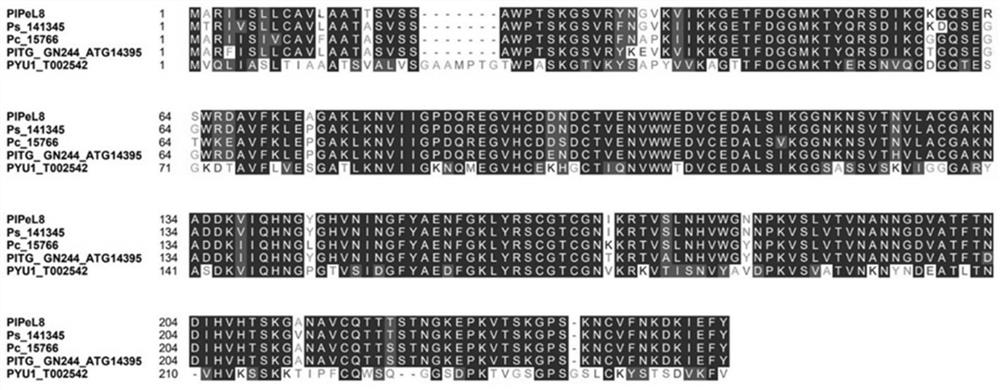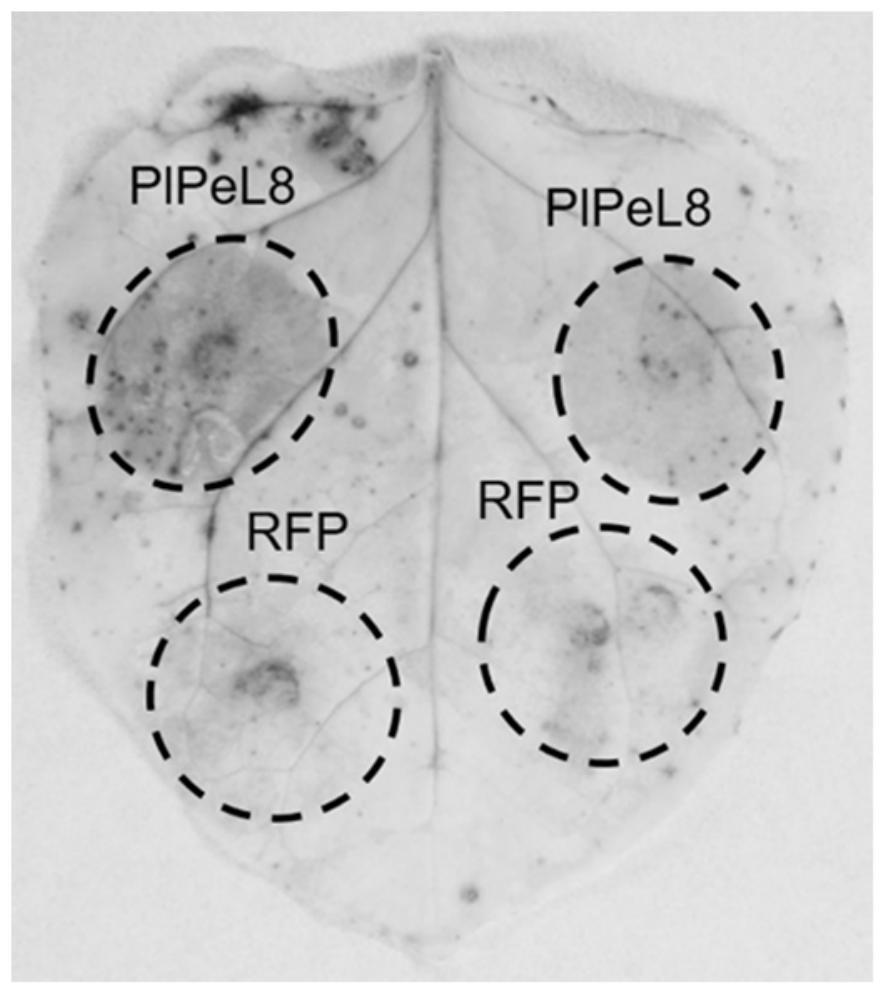Peronophythora litchii secreting type protein elicitor PlPeL8 and application thereof
A technology of litchi downy mildew and secreted protein, which is applied in the field of molecular phytopathology, can solve the problems of few resistance resources, difficulty in litchi breeding, and high risk of drug resistance, so as to improve disease resistance and plant disease resistance , Improve the effect of resistance
- Summary
- Abstract
- Description
- Claims
- Application Information
AI Technical Summary
Problems solved by technology
Method used
Image
Examples
Embodiment 1
[0042] Embodiment 1: Cloning and acquisition of PlPeL8 gene
[0043]Most plant pathogenic organisms secrete a large number of cell wall degrading enzymes (CWDEs), which degrade plant cell walls to obtain nutrients needed for growth and complete infection. At the same time, some CWDEs or molecules released by CWDEs degrading cell wall polysaccharides can act as inducers of plant immune responses. Among them, pectate lyase (Pectate Lyase, PL) is the main member of cell wall degrading enzymes. Based on the completion of genome and transcriptome sequencing of P. litchie, we predicted that P. litchie may encode a total of 19 pectin lyase genes. We designed full-length specific primers for pectin lyase 8 (PlPeL8), the primers contain homologous sequences at both ends of the vector cloning site, forward primer PlPeL8-F: 5'- GATAGCCGGTACCCCCC ATGGCTCGTATCATCTCAC-3', reverse primer PlPeL8-R: 5'- CTCTAGAGGATCCCC GTAGAACTCGATCTTGTCC-3' (the underlined sequence is introduced to be co...
Embodiment 2
[0052] Example 2: Prediction of homologous proteins of protein elicitor PlPeL8 in oomycetes
[0053] Use SeqHunter2.0 software, JGI genome database (https: / / genome.jgi.doe.gov / ), NCBI (https: / / www.ncbi.nlm.nih.gov / ) genome database as the basis, and perform PlPeL8 by Blast Homologous protein analysis. Three PlPeL8 homologous proteins: Ps_141345 (NCBI accession number: XP_009520586.1), Pc_15766 (NCBI accession number: KAG1685646.1), PITG_GN244_ATG14395 (NCBI accession number: KAF4033686.1), respectively from Phytophthora sojae, P.capsici and P.infestans have a homology rate of more than 90% with PlPeL8 and are highly conserved; Pythium ultimum homolog protein PYU1_T002542 (NCBI accession number: KAF1335911. 1) The homology rate is 53.1%.
[0054] Multiple sequence alignment of PlPeL8 and Ps_141345, Pc_15766, PITG_GN244_ATG14395, PYU1_T002542 was performed using BioEdit software, and it was found that the sequences were highly conserved in P. litchi and Phytophthora ( figure ...
Embodiment 3
[0055] Example 3: Transient expression of PlPeL8 and its homologous proteins in Nicotiana benthamiana induces allergic cell necrosis
[0056] The recombinant plasmid pBin-PlPeL8-HA obtained in Example 1 was transferred into 100 μL of Agrobacterium GV3101 competent, and the LB solid medium containing 50 μg / mL kanamycin and 50 μg / mL rifampicin was used for screening. After the clones were verified by colony PCR, they were shaken in liquid LB and cultured at 28° C. with shaking at 180 rpm for 1 to 2 days (d).
[0057] The bacteria were centrifuged at 4000rpm for 4min, the supernatant was discarded, and 10mmol / L MgCl 2 Suspended bacteria, washed 3-4 times in total, and OD 600 Adjust to 0.4~0.6. Use a 1mL sterile syringe without a needle to inject the Agrobacterium suspension on the back of vigorously growing Nicotiana benthamiana leaves at the 5-6 leaf stage, so that the target gene can be expressed transiently in Nicotiana benthamiana cells; at the same time, each leaf is injec...
PUM
 Login to View More
Login to View More Abstract
Description
Claims
Application Information
 Login to View More
Login to View More - R&D
- Intellectual Property
- Life Sciences
- Materials
- Tech Scout
- Unparalleled Data Quality
- Higher Quality Content
- 60% Fewer Hallucinations
Browse by: Latest US Patents, China's latest patents, Technical Efficacy Thesaurus, Application Domain, Technology Topic, Popular Technical Reports.
© 2025 PatSnap. All rights reserved.Legal|Privacy policy|Modern Slavery Act Transparency Statement|Sitemap|About US| Contact US: help@patsnap.com



